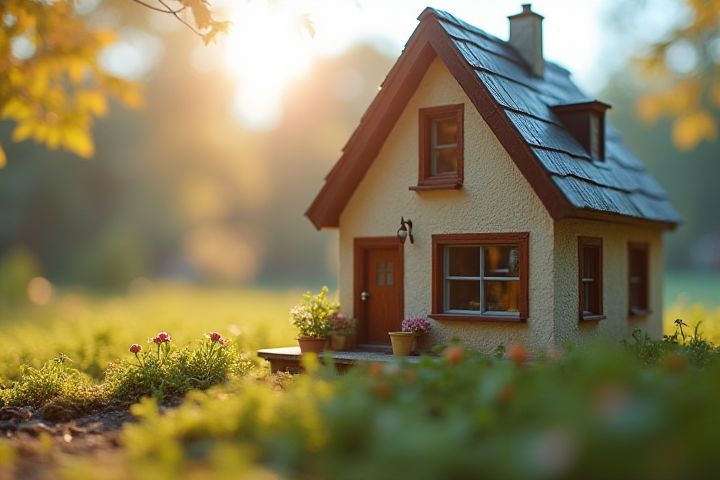
Houses appreciate in value due to various factors that influence the real estate market. Demand for housing often increases in areas with strong job growth, better schools, and low crime rates, driving home prices higher. The availability of financing options, such as lower interest rates, can make purchasing homes more accessible, stimulating demand and contributing to rising values. Renovations and home improvements also add to property value, enhancing both aesthetic appeal and functionality. Economic conditions, such as inflation and changes in supply and demand, directly impact housing prices, creating a dynamic market environment.
Why Do Houses Go Up In Value
Location desirability
Location desirability significantly impacts property values, as homes situated in well-regarded neighborhoods often appreciate faster than those in less desirable areas. Access to quality schools, parks, and public transportation can elevate a house's appeal, driving demand and increasing its market price. Communities with low crime rates and attractive amenities, such as shopping centers and entertainment options, further enhance desirability. In 2023, homes in high-demand urban areas have seen appreciation rates of 15% to 20%, underscoring the critical role of location in real estate value.
Economic growth
Economic growth significantly influences housing market dynamics by increasing demand for real estate, thereby driving property values upward. As the Gross Domestic Product (GDP) rises, job opportunities expand, leading to a population influx in urban areas; this heightened demand for housing often results in competitive bidding and higher prices. Additionally, as average household income increases--reportedly by 5% annually--homebuyers can afford more expensive properties, further escalating home values. Your investment in real estate can become more profitable in this environment as economic prosperity enhances the long-term appreciation potential of homes.
Housing supply and demand
Housing values typically rise due to an imbalance between supply and demand. When demand for homes in a particular area increases--often driven by factors such as job growth or population influx--while the supply remains limited, prices naturally escalate. For instance, in markets where new construction is slow or facing regulatory delays, even a slight uptick in buyers can create substantial competition, driving up home prices. Conversely, when housing supply exceeds demand, such as during economic downturns, home values tend to stagnate or decline.
Interest rate fluctuations
Interest rate fluctuations significantly impact housing values, as lower rates often lead to increased affordability, allowing more buyers to enter the market. For example, a reduction in mortgage rates from 4% to 3% can reduce monthly payments by approximately 25%, expanding your potential buyer pool. When demand rises due to favorable interest rates, home prices typically increase as sellers capitalize on heightened competition. Conversely, when rates rise, fewer buyers can afford homes, which may lead to a decline in property values, demonstrating the crucial link between interest rates and housing market dynamics.
Inflation impact
Inflation significantly impacts the value of houses by eroding the purchasing power of currency, leading to increased demand for tangible assets like real estate. As the cost of living rises, homeowners are often incentivized to invest in property, thereby driving up demand and prices. Historical data shows that during inflationary periods, housing prices can increase by an average of 3-5% annually, outpacing standard wage growth rates. Consequently, owning a house not only serves as a place to live but also acts as a hedge against inflation, solidifying its value in a fluctuating economy.
Infrastructure development
Infrastructure development plays a critical role in increasing house values, often leading to significant appreciation. Proximity to newly built transportation systems, such as highways and public transit, can enhance accessibility, making neighborhoods more desirable and driving property demand up by as much as 20%. Furthermore, the introduction of amenities like parks, schools, and shopping centers within a community can add another 15% to property values, as these features improve the quality of life for residents. Over time, as infrastructure investments continue, homes in these areas generally experience sustained growth, ensuring your real estate investment appreciates substantially.
Zoning laws and regulations
Zoning laws and regulations significantly influence property values by dictating land use, density, and the type of buildings permitted in an area. For instance, areas designated for residential or mixed-use developments often attract higher demand, driving prices upward. According to the National Association of Realtors, properties in well-zoned regions can appreciate up to 10% more than those in less regulated zones. When you consider investing, examining local zoning ordinances can reveal potential for future appreciation in your property's value.
Property improvements and renovations
Property improvements and renovations significantly enhance a home's value, often yielding a return on investment (ROI) of 70% to 90%. Upgrades such as kitchen remodels, bathroom renovations, and energy-efficient installations directly appeal to prospective buyers, making your property more attractive in a competitive market. According to industry reports, homes with updated finishes can sell for 20% more than those requiring repairs or outdated features. A well-maintained exterior, including landscaping and curb appeal, also contributes to an increase in property valuation, as first impressions play a crucial role in the buying process.
Neighborhood upgrades
Neighborhood upgrades, such as improved infrastructure and enhanced public amenities, significantly impact home values. When a community invests in features like parks, sidewalks, public transportation, and schools, property demand typically increases. Homes in neighborhoods with higher safety ratings and better access to these amenities can see value growth ranging from 5% to 20% annually. Your investment in a well-located property can thus be greatly enhanced by ongoing community developments that improve residents' quality of life.
Market speculation
Market speculation significantly influences the appreciation of house values, driven by the anticipation of future demand and investment potential. Investors often buy properties based on expected price increases, creating a competitive landscape that further escalates prices. For example, in 2022, regions with high investor activity saw home values surge by 15% or more compared to the previous year. As market sentiment shifts and buyers speculate on favorable economic indicators, the cycle of rising home prices continues, affecting your real estate decisions.
